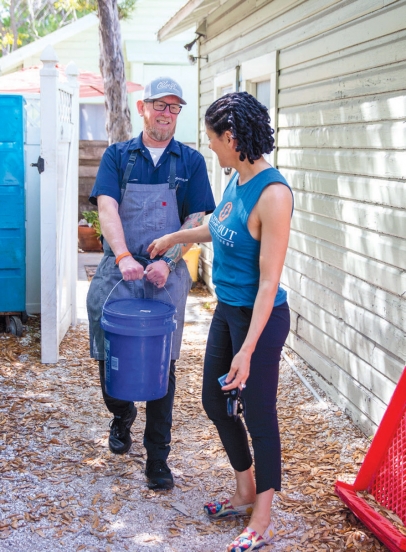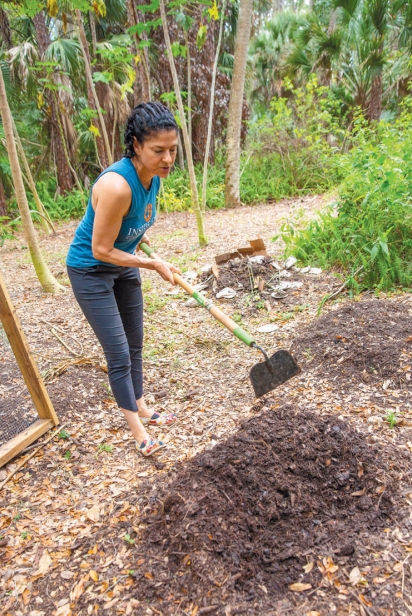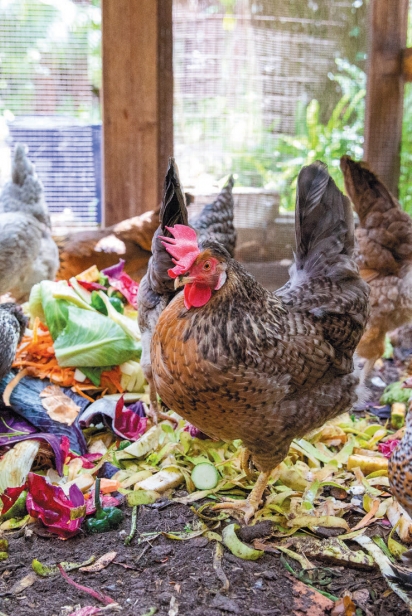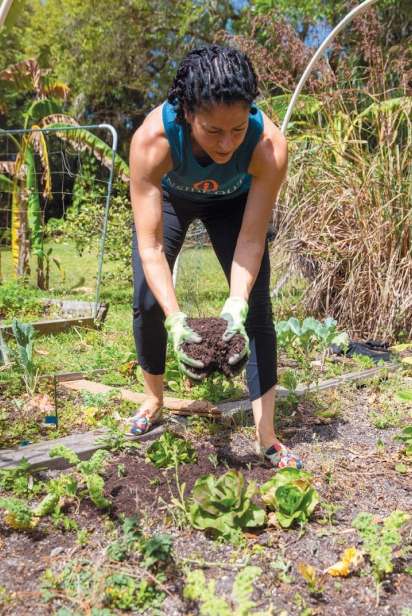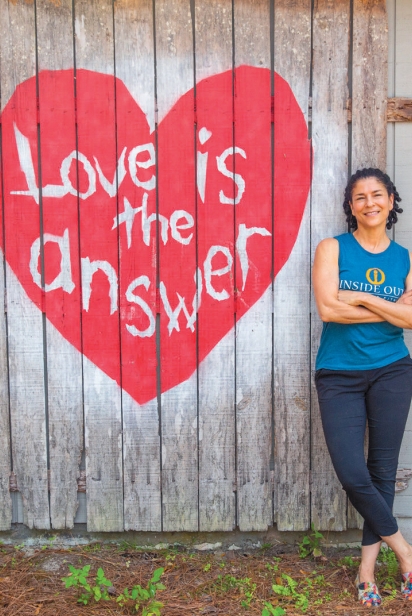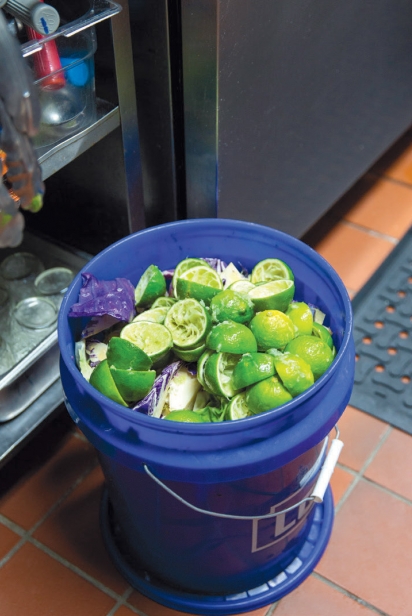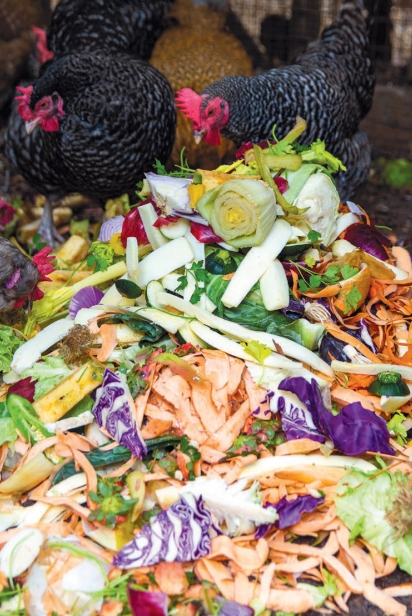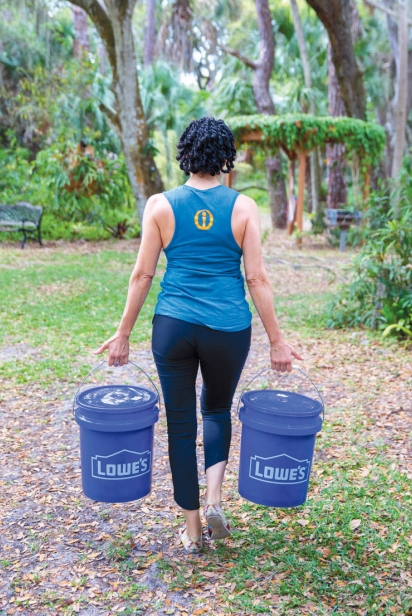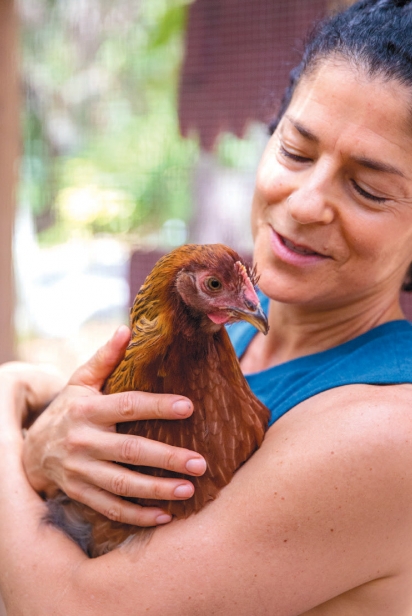Waste Warrior
Kat Cosentino
Her wanderlust days may be over but Kat Cosentino still considers herself a citizen of the world.
“I was an eternal nomad that wouldn’t have really called anywhere my home,” says Cosentino of her days traveling the world.
Although she still travels when she can, the Sarasota native seems pretty darn content on her 6.2-acre homestead in the heart of Sarasota. It is there that she tends to her beloved hens (there are 14), a vegetable garden, and fruit-filled orchard—a gift to herself for a recent birthday.
“I never thought I’d be a farmer. I am living out my life doing projects,” she says. “Things are happy here. It’s got some sort of magic.”
Cosentino was living in Italy in 2007 when an extended Christmas visit called her back to her roots—and to her parents, whose health was in decline. Cosentino’s father, a successful builder, had purchased the homestead property in 1968. Upon Kat’s return, she found peace there, eventually inheriting it and now living on and caring for it.
“Everything I have and have become is thanks to my parents, and everything I do here is to honor them,” says Cosentino.
But Cosentino is still in constant motion. Beyond all the work that her homestead requires, she runs a nutrition and fitness studio and is a passionate salsa dancer and instructor. Continuing something her mother used to do, she delivers food for Meals on Wheels once a week. And living on the land has also made Cosentino an environmentalist. She’s currently waging a personal war on single-use plastics and diverting food waste from the landfill however she can. She makes her own nut butter, buys in bulk, and composts scraps from her whole-food diet.
Cosentino hosts regular parties for her “salsa family,” too, using the gatherings to share waste reduction knowledge with her guests. Food is eaten off compostable plates; there are no plastic water bottles allowed.
“It’s possible to have a big social gathering without it being a huge expense to the environment,” says Cosentino, who goes through the trash after her parties. “Everything here is a big cycle. It’s about reducing landfill waste and raising awareness of food waste.”
It’s this mind-set that connected her with Steve Phelps, owner of the restaurant Indigenous, about a year ago to collaborate on a restaurant composting project.
Now, every Wednesday, Cosentino shows up to Indigenous with three empty five-gallon buckets and returns to the homestead with three different buckets full of food scraps collected by the restaurant.
First, she dumps them in the chicken coop.
“The chickens peck at it, spread it, and poop on it,” says Cosentino. A week later, she rakes what’s left into different compost piles, also containing her own food scraps and dry matter from her yard and parties. With weekly turns and the occasional sifting, a few months later she’s got black gold to use throughout her thriving homestead.
The partnership has had tangible results, too, for example reducing the restaurant’s use of garbage bags by half.
“And we are a little restaurant,” says Phelps. “Think of if every restaurant in town could eliminate that much waste,” he says. “And we are also saving money.”
The collaborators would like to expand the project, which Phelps has branded as Food Waste Warriors on Facebook, and they seek committed restaurants and like-minded individuals willing to join the composting cause.
“We have a community full of farms and homesteads like Kat’s,” says Phelps. “If the City can’t do it, let’s connect with these people and become partners.”
Cosentino stresses you don’t have to have a large property or chickens to compost, and you can start with your own household waste.
“We think ‘away’ when we set out our trash,” she says. “But if people had to dump their trash in their front yard, I’m pretty sure they would be much more aware of [what they are producing].”
Check out Food Waste Warriors on Facebook to stay up to date on how you can get involved.


